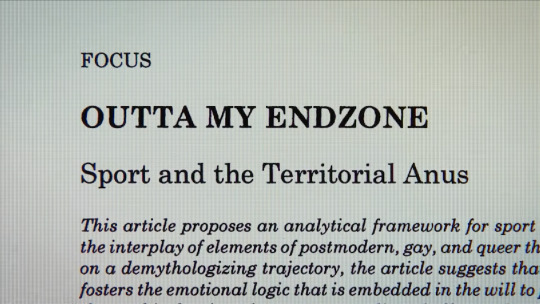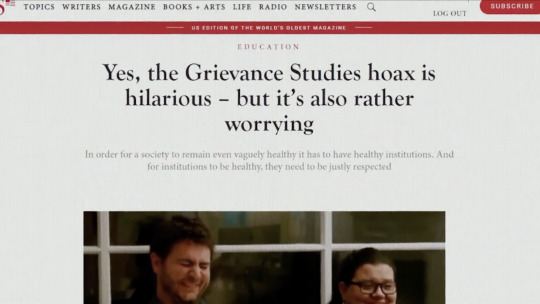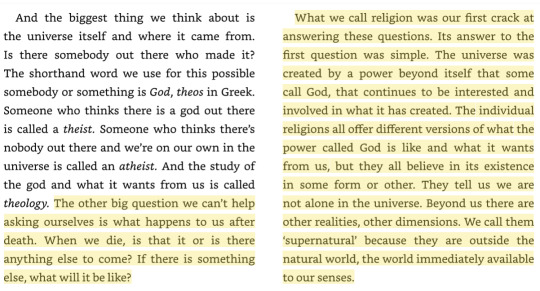#Conceptual Boundaries
Text

If you want to understand a person, do not listen to his words, observes his behavior. (Albert Einstein)
11 notes
·
View notes
Text
btw ppl who say “I wanted early-seasons sam back”
how did you react to early s8 sam lol bc that is indicative of how you would’ve actually felt abt it
#‘he should’ve talked back more like he used to’#watch s8!!!!!!!!!!!!!! see what happens to him when he tries to go back to setting boundaries#think abt how he conceptualizes stanford and the events that unfolded ‘as a result’#most of you guys don’t actually want sam to grapple for autonomy bc it triggers dean’s abandonment issues#spn
7 notes
·
View notes
Note
I see you, fellow Teddy disliker 🤝
validation.mp4
#i TRIED to like him for sooo long cuz theres nothing wrong w him like.......conceptually as a character#but hes just.......... actually kind of mean and doesnt respect boundaries and it makes me mad when he calls himself bobs best friend lol#but this part made me cheer out loud like at sportsball game#sry teddy likers...
68 notes
·
View notes
Text
By: Michael Sherman
Published: May 8, 2023
On May 7, 2023 a new documentary series by the filmmaker Michael Nayna, titled The Reformers, premiers on Substack (Part 1 is free, the additional 3 parts are paywalled). It's worth watching. The series is about the Sokal Squared hoaxed papers that revealed the hallow obscurantism of grievance studies. Here’s the description and trailer:
youtube
Skeptic magazine revealed the first Sokal Squared hoax paper, titled “The Conceptual Penis as a Social Construct: A Sokal-Style Hoax on Gender Studies.” The original paper is full of academic balderdash. For example:
We argue that the conceptual penis is better understood not as an anatomical organ but as a social construct isomorphic to performative toxic masculinity.
And:
We conclude that penises are not best understood as the male sexual organ, or as a male reproductive organ, but instead as an enacted social construct that is both damaging and problematic for society and future generations. The conceptual penis presents significant problems for gender identity and reproductive identity within social and family dynamics, is exclusionary to disenfranchised communities based upon gender or reproductive identity, is an enduring source of abuse for women and other gender-marginalized groups and individuals, is the universal performative source of rape, and is the conceptual driver behind much of climate change.
And:
Inasmuch as masculinity is essentially performative, so too is the conceptual penis. The penis, in the words of Judith Butler, “can only be understood through reference to what is barred from the signifier within the domain of corporeal legibility” (Butler, 1993). The penis should not be understood as an honest expression of the performer’s intent should it be presented in a performance of masculinity or hypermasculinity. Thus, the isomorphism between the conceptual penis and what’s referred to throughout discursive feminist literature as “toxic hypermasculinity,” is one defined upon a vector of male cultural machismo braggadocio, with the conceptual penis playing the roles of subject, object, and verb of action.
In their exposé the authors of the hoaxed paper, James Lindsey and Peter Boghossian, offer two reasons for their hoax: (1) the pretentious nonsense that often passes for scholarship in postmodernism studies, and (2) the lax standards of some peer-reviewed journals. Critics of the hoax pounced on the second, claiming that the journal that published their nonsensical paper, Cogent Social Science, is a lowered-tiered journal and therefore the hoax was a failure. My motivation for publishing the exposé focused on the first problem. To me, it wouldn’t have mattered if the hoax were published in the Annals of Improbable Research, The Journal of Irreproducible Results, or even the Onion. The point, for me, is not to fool journal editors, but to expose scholarship that passes for cogent argumentation in support of a thesis that is, in fact, what Gordon Pennycook, James Allan Cheyne, and their colleagues call “pseudo-profound bullshit.”

Bullshit, they write, is language “constructed to impress upon the reader some sense of profundity at the expense of a clear exposition of meaning or truth.” Bullshit is meant to impress through obfuscation; that is, to say something that sounds profound but may be nonsense. It may not be nonsense, but if you can’t tell the difference then, to quote Strother Martin’s character from the 1967 Paul Newman film Cool Hand Luke, “what we’ve got here is failure to communicate.” Compare, for example, any of the passages from the “Conceptual Penis” hoax to the abstract for the 2016 paper published in the peer-reviewed journal Progress in Human Geography titled “Glaciers, Gender, and Science”:
Glaciers are key icons of climate change and global environmental change. However, the relationships among gender, science, and glaciers—particularly related to epistemological questions about the production of glaciological knowledge—remain understudied. This paper thus proposes a feminist glaciology framework with four key components: 1) knowledge producers; (2) gendered science and knowledge; (3) systems of scientific domination; and (4) alternative representations of glaciers. Merging feminist postcolonial science studies and feminist political ecology, the feminist glaciology framework generates robust analysis of gender, power, and epistemologies in dynamic social-ecological systems, thereby leading to more just and equitable science and human-ice interactions.

When this paper was published I thought it was a hoax, so I contacted the University of Oregon, the institution of the paper’s authors, and confirmed it was real. And this is just one of countless examples, posted daily on Twitter @RealPeerReview and retweeted all over the Internet to the amusement of readers who cannot decipher what most of these articles are even about, much less comprehend their arguments and gain value from their conclusions.
What matters to me is the truth about reality (lower t and lower r), which science is best equipped to determine. Ever since the 1980s there has been a movement afoot in academia in which postmodernism has encroached on some of biology, much of social science (especially cultural anthropology), and most of history, literature, and the humanities, in which the claim is made that there is no truth to be determined because there is no reality to study. Nearly everything—from race and gender to genes and brains—is socially constructed and linguistically determined by our narratives. And the more obfuscating those narratives are about these socially constructed non-realities, the better. This is the very opposite of how science should be conducted and communicated, and it is, in part, why we are currently witnessing the campus madness involving student protests—and even violence—when their unscientific postmodern unreal worldviews collide with the reality of contradictory facts and opposing viewpoints. It’s time we put a stop to the lunacy and demand critical thinking and clear communication.

The Morality of Hoaxes
The beauty and power of a well-executed hoax is that it reveals deeper truths not only about both the victims of the hoax and the hoaxers themselves, but about human nature and the foibles of our belief systems.
Decades of careful and extensive research into cognition and the psychology of how beliefs are formed reveals that none of us simply gather facts and draw conclusions from them in an inductive process. What happens is that most of us most of the time arrive at our beliefs for a host of psychological and social reasons have little or nothing to do with logic, reason, empiricism, or data. Most of our beliefs are shaped by our parents, our siblings, our peer groups, our teachers, our mentors, our professional colleagues, and by the culture at large. We form and hold those beliefs because they provide emotional comfort, because they fit well with our life styles or career choices, or because they work within the larger context of our family dynamics or social network. Then we build back into those beliefs reasons for why we hold them. This process is driven by two well-known cognitive biases: the hindsight bias, where once an event has happened or a belief is formed it is easy to look back and reconstruct not only how it happened or was formed, but also why it had to be that way and not some other way; and the confirmation bias,, in which we seek and find confirmatory evidence in support of already existing beliefs and ignore or reinterpret disconfirmatory evidence.
Given this state of our cognitive limitations, it should not surprise us that a movement arose in the 1980s that is variously described as postmodernism, deconstructionism, or cognitive relativism. Going far beyond cognitive psychology and leaning heavily on Marxist notions of cultural and class determinism, this academic movement came to believe that there are no privileged truths, no objective reality to be discovered, and no belief, idea, hypothesis, or theory that is closer to the truth than any other. In time, the movement spilled out of lit-crit English departments into the history and philosophy of science, as professional philosophers and historians, swept up in a paroxysm of postmodern deconstruction, proffered a view of science as a relativistic game played by European white males in a reductionistic frenzy of hermeneutical hegemony, hell bent on suppressing the masses beneath the thumb of dialectical scientism and technocracy. Yes, some of them actually talk like that, and one really did call Newton’s Principia a “rape manual.”
In 1996 the New York University physicist and mathematician Alan Sokal put an end to this intellectual masturbation with one of the greatest hoaxes in academic history. Sokal penned a nonsensical article entitled “Transgressing the Boundaries: Toward a Transformative Hermeneutics of Quantum Gravity,” choc-a-block full of postmodern phrases and deconstructionist tropes interspersed with scientific jargon, and submitted it to the journal Social Text, one of two leading publications frequented by fashionably obtuse academics. One sentence from the article, plucked randomly from the text, reads as follows:
It has thus become increasingly apparent that physical “reality”, no less than social “reality”, is at bottom a social and linguistic construct; that scientific “knowledge”, far from being objective, reflects and encodes the dominant ideologies and power relations of the culture that produced it; that the truth claims of science are inherently theory-laden and self-referential; and consequently, that the discourse of the scientific community, for all its undeniable value, cannot assert a privileged epistemological status with respect to counter-hegemonic narratives emanating from dissident or marginalized communities.
Sokal’s article was accepted for publication (as “real”, whatever that means in postmodernism), and upon release Sokal revealed it was all a hoax, and did so, deliciously, in the chief competitor of Social Text, the journal Dissent. Sokal called it a nonsense parody, but because most of what passes for postmodernism is nonsense and indistinguishable from parody, the editors of Social Text could not tell the difference! Q.E.D.
Subsequently, Sokal published a comprehensive book-length explanation, Beyond the Hoax, that provides readers with an annotated edition of the original article (explaining how he came up with each and every meaningless phrase!), the subsequent article in Dissent in which he explained himself to the disgruntled readers of Social Text, and a number of subsequent articles and essays he wrote in the decade since the hoax in which he elaborated on the problems inherent in postmodern philosophy of science. The golden nugget within this longish book—worth the price of admission by itself—is the annotated parody. For example, explaining the above passage, divided up into the semi-colon phrases, Sokal writes (with ellipses denoting the phrase explanations):
This statement is, of course, absurd, but it reflects several conceits of “postmodern” theoretical writing. First of all, reality (even physical reality) has become in certain circles a no-no concept, which must be placed in scare quotes. … This assertion is a commonplace (dare I say a cliché) in radical-social-constructivist writing about science. Like most clichés, it contains a grain of truth but greatly exaggerates the case. Above all, it fails to make the crucial distinction between actual knowledge (i.e. rationally justified true belief) and purported knowledge. … The theory-ladenness of observations goes back at least to physicist-philosopher Pierre Duhem in 1894; it poses problems for the most naïve falsifiability theories but by no means undercuts the epistemic claims of science. … This statement is silly, but it strikes the right emotional chords: against “privilege” (especially scientists’ privilege) and in favor of the “counter-hegemonic”, the “dissident”, and the “marginalized”. … Note, finally, that the four assertions contained in this sentence are at the very least debatable (if not downright absurd); certainly some argument in their favor ought to be required. But the editors of Social Text were happy to publish an article in which these assertions are taken for granted. Apparently in certain circles nowadays these assertions are taken for granted.
Hoaxes are one of the most powerful tools of instruction and edification ever created because they reveal a weakness in human cognition involving gullibility and self-deception. As long as no one is hurt in the process and the reveal in the end is complete and honest, hoaxes are a form of magic.
Magicians, for example, intentionally deceive their audiences, but as long as they are not claiming to use paranormal or supernatural powers (so-called “real magic”), magic can be one of the best tools for understanding how the mind works by revealing how easily it is tricked. From a scientist’s and skeptic’s perspective, magicians like Penn and Teller are effective because they not only deceive their audiences, they often also reveal how the tricks are done in order to make a deeper point about deception, self-deception, and honesty. A properly executed hoax can be as entertaining and educational as a good magic show.
Moral objections to hoaxes should be reasonably considered, of course, but as long as no one is hurt in the process and the hoax is revealed in the end and shown to be executed with good intentions to make a deeper point, there is nothing unethical or immoral about hoaxing, and in fact the beauty and power of a well-executed hoax is that it reveals deeper truths not only about both the victims of the hoax and the hoaxers themselves, but about human nature and the foibles of our belief systems.
Why do people fall for such hoaxes? The hindsight bias and the confirmation bias. Once you believe that science holds no privileged position in the search for truth, and that it is just another way of knowing, it is easy to pull out of such hoaxed articles additional evidence that supports your belief. It is a very human process, and since science is conducted by very real humans, isn’t it subject to these same cognitive biases? Yes, except for one thing: the built-in process known as the scientific method.
There is progress in science, and some views really are superior to others, regardless of the color, gender, or country of origin of the scientist holding that view. Despite the fact that scientific data are “theory laden,” science is truly different than art, music, religion, and other forms of human “knowing” because it has a self-correcting mechanism built into it. If you don’t catch the flaws in your theory, the slant in your bias, or the distortion in your preferences, someone else will, usually with great glee and in a public forum, for example, a competing journal! Scientists may be biased, but science itself, for all its flaws, is still the best system ever devised for understanding how the world works.
==
It's enlightening, but also disturbing, to see the nonsensical academic shibboleths that we're surrounded by today are unchanged from Sokal's hoax almost 30 years ago when he spotted the problem.
They've been concocting buzzword-laden nonsense, peddling intellectual fraud as wisdom, and inventing fake credentials through bogus journals - aka "idea laundering" - for no less than that long.
youtube
#Michael Shermer#Skeptic Magazine#Mike Nayna#The Reformers#Grievance Studies scandal#Grievance Studies#Grievance Studies hoax#Grievance Studies Affair#Alan Sokal#Transgressing the Boundaries#The Conceptual Penis#feminist glaciology#feminist theory#James Lindsay#Peter Boghossian#Helen Pluckrose#academic corruption#idea laundering#ideological corruption#ideological capture#wokeness as religion#woke#wokeism#cult of woke#wokeness#buzzwords#social constructivism#reality denial#postmodernism#religion is a mental illness
6 notes
·
View notes
Text
Shaking the Tree - An Introspective Exercise
"Hidden Figures" bares all in more than just the literal sense. Along with being a cathartic piece to work through my complex feelings about existing in the Seattle area, it also morphed into a project that challenged me to peel back my layers, a chance to show where the visions in my mind can go with just my body as the instrument to paint the picture. No fancy styling or special props; no studio sets or characters to hide behind - it is both literally and figuratively a stripping down to my bare artistic roots and basics.
.
After winning my first award for my photo work - a Juror’s Choice Award at the '22 Seattle Erotic Arts Festival - I was so proud of myself and my dedication to creating for getting myself to that accomplishment...but soon to follow the achievement was that big thoughts artist question:
.
........................"Well shit - how do I top myself now?”
.
Afraid of stagnating, sophomore slumping, or becoming complacent, I wanted to push my work and creativity to another level but wasn’t sure exactly how. So I thought to look at the building blocks and hallmarks of past successfully delivered pieces with the goal of figuring out how I could further squeeze those strengths, shake their tree and see what dropped down:
Strong concepts and characterizations, expressiveness,
bold posing choices and the understanding that sometimes the small details make the biggest impact...
.
What could I do to push the abilities and processes I’d been honing these past few years?
.
A few months after this creative self inventory, the Hidden Figures concept started to take shape. And as I took note of which sculpture pieces elicited emotional reactions from me, took note of the pieces I saw myself interacting with - as the deeper cathartic exercise of the project came into focus - I also realized that the park could be an ideal setting to challenge myself, my creative direction, and the building block strengths I had identified.
.
Could I apply my storytelling, cathartic expression vision to a setting and scene that I did not create myself? Could I make the points I wanted to speak to come through without loud accoutrements and replications? Could I express my inner feelings and experiences clearly between the pieces with just the expressions on my face and the shapes I made with my body? Could I and my little messages stand out in - even as I sought to blend into - the landscapes of these iconic giants?
.
With my missions in mind, the time for pondering questions under the tree had past. Standing beneath it, on an early summer morning, it was now my chance to pursue its fruits.




+ photographed by @skyclad.studio (ig) // website
#creative process#conceptual art#late night introspection#sophomore slump#pushing boundaries#self improvement#art process#seattle artists#portrait photography#introspective#photo composition#push yourself#push your limits
2 notes
·
View notes
Text
becoming the next Maggie* the way I'm forcing everyone in our system into my found family
#pk;m half light🔴#made conceptualization go on a walk with me and also made it eat a muffin :) new dad unlockedJGKDKFGK#conceptualization: ❌‼️DNI‼️❌ | me: . that won't stop me because I can't read 😃👍❗#THATS5 A JOK3 THAT'S A JOKE IF IT DIDN'T WANT ME TO BE AROUND IT COULD JUST FUCKING KILL ME ABOUT IR#SERIOUSLY. IT'S F I N E I'M NOT OVERSTEPPING BOUNDARIES DON'T WORRYHFJDKCXKZKCKCK#*maggie is another syskid of ours who's also just walked up to random sysmates and went 'ur my parent now' it's hilarious
2 notes
·
View notes
Text
Honestly why express any opinions at all if they’re just gonna set you up for community isolation and disagreement with friends
#are moots friends?#I think they are but i don’t want to step on any boundaries#this is how u know my anxiety has gotten worse bc like . I can’t even conceptualize people being friends with me#but that’s neither here nor there#it’s just stupid bc either u agree with the general consensus or u create an argumentative dynamic that is beneficial to NO ONE#this isn’t abt like real issues either#if ur friend is racist or whatever… kill them#but like blue check mark and blank blog opinions#idk I’m just not even gonna set myself up for confrontation#even if I do have feelings this way or that#wowww why is my sense of power so f*cked up#anyway that’s not to say I think the blue check mark thing is stupid#idk how to feel abt it honestly#but like talking abt that other than here??#no no no nobonononoononono#I think the real issue is just. not everyone has $8 to spare.#and normally I’d be like haha whatever#but I’m one of those ppl#so it does seem frivolous#but also it’s just on the mind bc of that one person who spent $*** on a ******#like ……. NOT hating I used to collect toys I get it#but as a broke person…… damn. they’re a lucky person#Lmaoo broke people should never laugh#anyway if that’s just to say my anxiety is horrible and I hate feeling differently from the crowd bc I don’t wanna upset anyone#uhhhhhhhh also I’m gonna be in three lit classes next semester#I’m gonna [redacted] honestly#it’s stupid bc if I’m reading so many books at the same time I won’t remember jack#but it’s okayyyyy ig#the real problem is gonna be the essays#caitie blabs
5 notes
·
View notes
Text
ok the way that gender and mysticism intertwine in the Norse faith alongside horses (the Allfather calling himself “gelding” hello?????) has me thinking. Thoughts abt the Rohirrim
#as always. it’s just sth I’ve touched vaguely on in other posts and I do kind of want to stew on it fully#bc of course there’s sleipnir as a vehicle to cross boundaries that are otherwise seemingly-uncrossable#and im thinking abt Gylfaginning and Hár and listing all the horses of the gods which is just. yeah lol#I do also think the Rohirrim having a parallel myth for the Mearas <--> Sleipnir’s birth would conceptually be SO interesting#at least in the sense of ‘born from a male god who turned into a mare’ lol#waves hello at Loki lol#hail to the father of the greatest of horses#and that’s just horses#that’s not even touching on the fact the spear-rider calls himself Gelding as a Seiðr practitioner (while living as a woman)
1 note
·
View note
Text

Earth provides enough to satisfy every man’s needs, but not every man’s greed. (Mahatma Gandhi)
10 notes
·
View notes
Text
super intrigued by the new bad omens album with no bad omens 👀
#conceptually I love it push the boundaries I would expect nothing less#but I like bo so when I listen to bo music I wanna hear bo#will be strapped in anyway
1 note
·
View note
Text
that fanfiction = reading books poll being like 40% “NO!!” and 30% “well its complicated” is so good. i pray the amount of “yes” diminishes further and further
#and ideally ‘its complicated’ grows#like i dont blame anyone voting no its also basically correct but we gotta keep in mind that books themselves ARE also fallible commodities#whose conceptual boundaries are entirely based around arbitrary passed-down definitions
1 note
·
View note
Text
When you encounter a person who does not do something that you consider normative, you need to understand that they could be either stating a barrier or expressing a boundary. A barrier is "I would like to partake of the normative activity, but I can't due to other factors." A boundary is "I have made a decision not to participate in the normative activity."
Many people do not believe that boundaries actually exist! This is why it's so common to give a clear "No" on an issue and get inundated with people saying "But have you tried-" They can't conceptualize that anyone might actually want to avoid X thing, so they assume that you totally want to do X and you would love X so much if only they could figure out a way around whatever pesky obstacle is getting in your way. But humanity contains multitudes, and for any given experience you consider vital for happiness I promise there are people who are Just Not Interested.
If someone is stating a boundary, do NOT talk about how sad their life must be, and do NOT try to push them! Just accept that their life experience is very different from your own, and isn't that a beautiful thing?
Barriers are different. Barriers suck. With boundaries, the only problem is other people being dicks. With barriers, the problem is the barrier itself . . . and probably, additionally, people being dicks. There's really not a way to win in the people being dicks department when you don't do something that other people have decided is Necessary For Humaning.
If someone is talking about a barrier they face, still don't talk about how sad their life must be, although it's fine to commiserate with a friend if they're complaining. It's hard! Some barriers are pretty insurmountable; the person might not ever get to do X even though they want to. And a lot of people don't believe that this kind of barrier exists either; we're very much taught that you can do anything if you try hard enough, when that is simply not true. If someone tells you that they can't do something, listen to them and respect that.
The only reason for not doing X that people really acknowledge as real are the surmountable barriers. And these are real, but even in these cases you should always assume that the person knows themself best and not give advice unless they've specifically asked for it. But if they have asked, it's chill to try to brainstorm solutions with them.
As someone who has both things going on, it really sucks that people tend to assume that everything is a) a barrier issue and b) that they personally have the solution to it. Don't do this.
The only way you can tell if something is a boundary or a barrier is to listen to people and believe them.
Example:
If you offer someone a drink and they say, "No thanks . . . I haven't really found anything that I like yet," (barrier, potentially surmountable) it is probably cool to ask them if they're open to trying something new, and if they say yes ask about their tastes to try to find a drink they would enjoy! They might like it or they might not.
If you offer someone a drink and they say, "I can't, it interacts with my meds," (barrier, insurmountable) you can say, "Aw, that sucks!" and offer them something nonalcoholic.
If you offer someone a drink and they say, "I don't drink," (BOUNDARY) you should give them a mocktail and shut the fuck up.
#this post is about being ace and also being a teetolaler and also being disabled and also--#there are some things i don't want to do and i am sick of people assuming that really i *must* want to#becuase no one could *really* be uninterested in drinking or sex or whatever#and there are also some things that i desperately want to do that i can't because of the curse#but a random stranger doesn't know which is which unless i tell them#you've got to listen to people when they tell you what they want or don't want to do#and you've got to listen to people when they tell you what they can and can't do
3K notes
·
View notes
Text
Variations in conceptualizing god
("Even god isn't god.")
People: Don't you realize that God IS ACTUALLY (person / concept / perspective)
Me: What IS God tho--the very concept of God is answering very complicated questions; I can't quite conceptualize this as simply, "a commander / boss / authoritarian / father / protector." To some degree, everyone will play at least one of these roles at some point.
If a story is done well, or if it goes on long enough and does not simply dissolve into narrative pyrotechnics, it will struggle with it. We're supposed to struggle with it. That's because families and relationships function in terms of decision-making, protectorship, rejection, boundary-making etc. Military dynamics will reflect this extra strongly if we're talking decision-making and chain of command.

You know how I feel about the metawriting and "It was all a dream" approaches, but I also feel pretty strongly about moving beyond broad strokes of archetype and hierarchy. That is, fully developed characters are more than their archetypes. (That's why I think I loved that Mary decimated her traditional "motherhood" upon her arrival in season 12.)
Furthermore, when we see viewers talk about god in particular, it's fascinating because we can clearly a delineation between these approaches:
- the ones who connect it with faith; god is who we pray to for guidance and support and love and deliverance from suffering; god is holy physician
- the ones who see it in a more authoritarian / governmental light, i.e. the one who makes rules; god is holy commander
- the ones who mistake familial fear & anxiety for real societal directive; especially those difficult decisions based in fear and desperation; god is holy tyrant-parent
Further still, you can push the meaning beyond narrative, to mean "that entity which a still-beating heart is sacrificed to," in order to keep the sun rising show going; in which case, the answer is undoubtedly the god is audience.
#spn vs god#my takes#some people use god as a shorthand for trying to exert control#or even concepts of commandership in the military and authoritarianism#but it is ALSO the slow growth of relating self to world and other which we like to eventually see culminate eventually in WISDOM#there's a reason we conceptualize god as parent#but it isn't that the notion of a parent is simply evil and gripping the reigns of allowing or disallowing “agency”#it's that growth cycle of the human life!#i'm showing my age again i know#it's that balance between safety and protection esp when it comes to family#religion meanderings#a parent or a spouse or an older sibling or anyone that is protector is ALWAYS struggling with protective boundaries...that's life#i want to protect you but i must send you strategically INTO battle is specifically MILITARY life and cannot simply be stripped down#into civilian-style domesticity and make any sort of FULL sense in terms of how the stress of that system operates
0 notes
Text
impossible is impossible⋆.��࿔*:・❄️

the very concept of impossible cannot exist. wanna know why? the definition of impossible is inconceivable, not able to exist, occur or be thought of. if impossible did exist we wouldn’t be able to think of whatever we are classifying as impossible.


therefore the very definition of impossible is self defeating. if you can conceptualize it, it is possible. the fact that you can even imagine something as “impossible” literally proves that it can be possible. if it was impossible, you wouldn’t be able to think of it.
SO WHAT R THE BOUNDARIES AND LIMITS?
the boundaries or limits to what you can and cannot manifest is entirely up to you, your thoughts, and how you choose to condition your mind. we are boundless beings. unlimited consciousness, the source if you will. so naturally we have no limitations, only the ones in which we put ourselves.
so before you ask a question like “can I manifest this/that”. STOP yourself and realize why that’s foolish. you decide if you can/cannot manifest it but essentially you can manifest anything. manifestation is not a logical concept so don’t try to make it into something that it is not.
THERE R NO RULES
with that being said there are no rules. you define your own rules, you define your own journey. you don’t have to ask for permission to manifest what you want. you don't have to ask “can I manifest this/that” because you are the creator in your reality so that's up to you, why give the power to someone else?
when you ask those kinds of questions you are only perpetuating your own limiting beliefs and keeping yourself in a victim mindset, and that's not hot.
#law of assumption#honeytonedhottie⭐️#it girl#becoming that girl#self concept#that girl#it girl energy#dream girl tips#dream girl#dream life#manifesting#manifesting tips#manifestation#manifestation tips#manifestation concepts#honeys master class#loa tumblr#loa blog#loa is easy
481 notes
·
View notes
Text
some misc worldbuilding questions to get your gears turning:
Do they have germ theory or some equivalent? How do they conceptualize the spread of disease and infection?
Is the everyday economy based more on trade/barter or currency? Is the currency valuable in its own right, or is it just something agreed upon to have value (eg. salt or gold vs. paper money)
What is their main method of lighting? What resources does this use?
Primary mode of transportation? How much does this vary based on things like purpose of travel, social class, etc.?
How much of a knowledge/education gap is there between social classes? Is there a baseline of education that everyone gets/is expected to have?
What are the most popular modes of storytelling? Is everyone telling campfire stories? Are they going to plays? puppet shows? are they going to the cinema? are they reading novels or epic poetry? Are there any folk characters or pop culture things that most people are familiar with?
Where does most people's moral framework primarily come from? Religion? Philosophy? Are there different schools of thought? How much do they vary?
Is there anything considered scandalous/improper/taboo that's normal in your own culture? and vice versa
Do most people live and die where they are born, or is it common to relocate and travel widely? how much does this vary by class/profession/region?
What do they do with criminals? Do they have an extensive prison system? If so, who funds/runs it? If not, how is crime discouraged/managed? Are there specific punishments for specific crimes?
How rigid are their class boundaries? How possible/common is it for someone to change social classes?
Is there anything that people get dangerously addicted to in your world? How accessible is it?
How easy is it for someone to do research/look up information they don't know? What is the primary method of doing this?
What holidays do they have? Any weird traditions? Fun traditions? Are they universally celebrated, or only by specific groups of people?
How do they dispose of their dead? How do they honor their dead?
How much exchange is there between cultures? Do people of different groups intermingle, or do they mostly stick with their own people?
How common is it to speak more than one language, and who is most likely to be multilingual?
How much do regional dialects/accents vary within the same language? Are there any dialects/accents that are stigmatized? Do different accents have different associated stereotypes?
This isn't meant to be taken as a checklist that you have to completely fill out btw. Just things that might help add flavor to your world and characters. (Also mostly things I end up thinking about logistically anyway as they become relevant to the plot or a character's frame of reference.) Enjoy!
531 notes
·
View notes
Photo

Hadrian's Wall
Hadrian's Wall (known in antiquity as the Vallum Hadriani or the Vallum Aelian) is a defensive frontier work in northern Britain which dates from 122 CE. The wall ran from coast to coast at a length of 73 statute miles (120 km). Though the wall is commonly thought to have been built to mark the boundary line between Britain and Scotland, this is not so; no one knows the actual motivation behind its construction but it does not delineate a boundary between two countries.
While the wall did simply mark the northern boundary of the Roman Empire in Britain at the time, theories regarding the purpose of such a massive building project range from limiting immigration, to controlling smuggling, to keeping the indigenous people at bay north of the wall. The wall continued in use until it was abandoned in the early 5th century CE.
Purpose
The military effectiveness of the wall has been questioned by many scholars over the years owing to its length and the positioning of the fortifications along the route. The argument goes that, had the wall actually been built as a defensive barrier, it would have been constructed differently and at another location. Regarding this, Professors Scarre and Fagan write,
Archaeologists and historians have long debated whether Hadrian's Wall was an effective military barrier…Whatever its military effectiveness, however, it was clearly a powerful symbol of Roman military might. The biographer of Hadrian remarks that the emperor built the wall to separate the Romans from the barbarians. In the same way, the Chinese emperors built the Great Wall to separate China from the barbarous steppe peoples to the north. In both cases, in addition to any military function, the physical barriers served in the eyes of their builders to reinforce the conceptual divide between civilized and noncivilized. They were part of the ideology of empire. (Ancient Civilizations, 313)
This seems to be the best explanation for the underlying motive behind the construction of Hadrian's Wall. The Romans had been dealing with uprisings in Britain since their conquest of the region. Although Rome's first contact with Britain was through Julius Caesar's expeditions there in 55/54 BCE, Rome did not begin any systematic conquest until the year 43 CE under the Emperor Claudius (r. 41-54 CE).
The revolt of Boudicca of the Iceni in 60/61 CE resulted in the massacre of many Roman citizens and the destruction of major cities (among them, Londinium, modern London) and, according to the historian Tacitus (56-117 CE), fully demonstrated the barbaric ways of the Britons to the Roman mind.
Boudicca's forces were defeated at The Battle of Watling Street by General Gaius Suetonius Paulinus in 61 CE. At the Battle of Mons Graupius, in the region which is now Scotland, the Roman General Gnaeus Julius Agricola won a decisive victory over the Caledonians under Calgacus in 83 CE. Both of these engagements, as well as the uprising in the north in 119 CE (suppressed by the Roman governor and general Quintus Pompeius Falco), substantiated that the Romans were up to the task of managing the indigenous people of Britain.
The suggestion that Hadrian's Wall, then, was built to hold back or somehow control the people of the north does not seem as likely as that it was constructed as a show of force. Hadrian's foreign policy was consistently “peace through strength” and the wall would have been an impressive illustration of that principle. In the same way that Julius Caesar built his famous bridge across the Rhine in 55 BCE simply to show that he, and therefore Rome, could go anywhere and do anything, Hadrian perhaps had his wall constructed for precisely the same purpose.
Continue reading...
209 notes
·
View notes